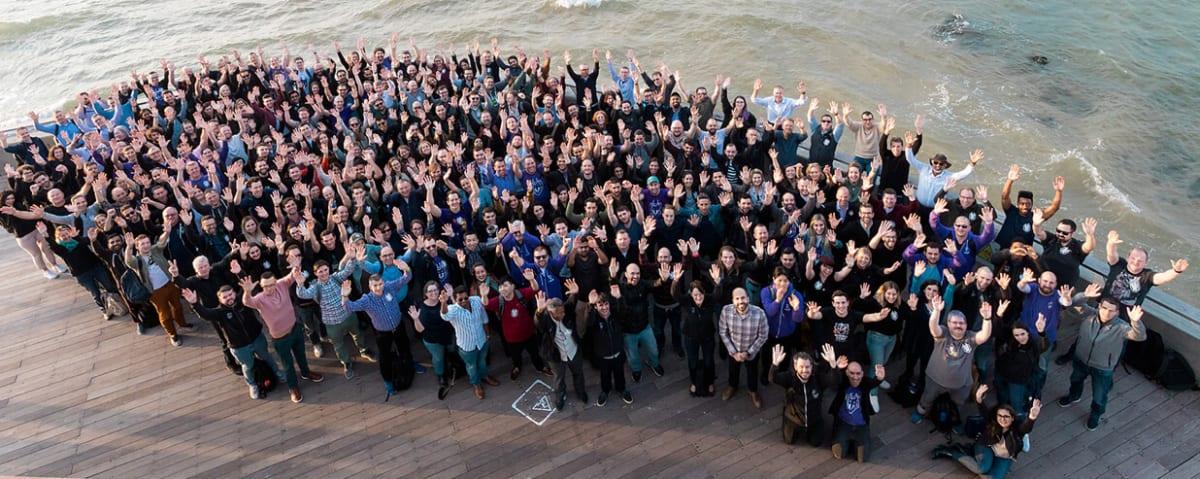Protecting our culture as we hyperscale
Dipti Salopek
4 février 2020
0 minutes de lectureAt Snyk we have been growing at an incredibly fast rate, in line with the market opportunity in front of us. In 2019, we’ve been doubling in size every six months. In 2020, we predict a continuing trend of rapid growth. One of the challenges that is top-of-mind for us all is how we protect our culture and cohesiveness through this rapid expansion.
Our culture — tight-knit, supportive, hyper-collaborative — is distinctively one of the key ingredients to our success. Our culture was the glue that held us together and kept us grounded throughout a period of explosive growth. To name a few of the changes that took place last year, we have launched a new product, acquired a conference, hired a new CEO, doubled the size of our company and announced two separate fund-raising rounds!
There are many companies out there with incredibly positive cultures. What makes our culture so distinctive is how intimate and familial it is. That’s something that I, personally, haven’t experienced before. As a unit, snykers are incredibly supportive and caring of each other. As we continue to scale, it is inevitable that our culture evolves with time. Despite the general excitement of growth and evolution, we all have a deep fear of losing something of our special culture along the way.
The leadership team has spent much time trying to identify exactly what qualities constitute the essence of our culture so that we protect those while the rest of our culture evolves. We’ve narrowed these down to two key attributes: the trust we have among us and the nature of our collaboration.
Trust
Snykers trust each other implicitly. We support each other, genuinely celebrate each others’ wins, and proactively extend a hand when we see someone struggling. I hear it from new joiners time and time again — Snyk has an incredibly warm and supportive atmosphere. This, however, is mostly made possible by our — still — manageable company size. It’s fair to say that at Snyk everyone knows everyone. However, as we get larger and we are forced into more interactions with colleagues that we don’t know that well, this implicit trust becomes a lot harder. Dunbar’s Number 1 suggests that, as we continue to scale, we need to be mindful and intentional about how we invest in building trust as a company — this won’t happen naturally and by coincidence anymore.
One step towards building trust is honest dialog. As we scale, there will inevitably be a lot of difficult choices to make, and difficult news to deliver. Honest dialog is about having the courage to give honest feedback to our colleagues — to deal with those moments of delivering difficult news. Honesty is the caring and kind thing to do. It isn’t easy, but doubling down on compassionate honesty is our only chance to continue building upon the high level of trust and intimacy we are lucky enough to share today. We’re supporting all our people leaders with substantial training in this area.
Collaboration
The other unique feature of our culture lies in the nature of our collaboration. Our collaboration (through online conferencing, public Slack channels, and lots and lots of travel) is many-to-many. It’s both asynchronous and instantaneous, mostly driven by the ubiquitousness of Slack. However, the way we collaborated over Slack channels when we were only 100 people appears to be bursting at its seams as we transition from Hoffman’s proverbial Tribe to Village 2. We strongly believe in protecting the transparency and autonomy that comes from having most of our communication take place in public channels and available to all. But we also notice that, as we scale, there’s increasingly more “noise” in the system. If we are to protect the transparency, we have to reduce this noise and change the way we collaborate to be more targeted to relevant audiences.
We aim to shield company transparency while reducing excess noise through a series of investments in tools (optimizing user experience in Slack and video conferencing), establishing processes (educating on behavioral changes with Slack) and in-person events, ranging from employee-wide global events, to frequent team and topic-specific events that’ll help us focus communication and collaboration among targeted and relevant audiences.
As we scale, our culture will naturally evolve. As much as we love our culture today, we recognize and embrace our evolution. But even as we do so, we are eager to protect the core of our culture: our implicit trust, and our unique collaboration.
1 Dunbar’s Number is defined as the cognitive limit to the number of deeper social relationships a person can sustain over time - typically agreed by social scientists to be 150.
2 Reid Hoffman’s work on Blitz-scaling, which describes how companies need to operate differently through their different stages of development: Family (10 or less employees), Tribe (10 - 150 employees), Village (100’s of employees).
